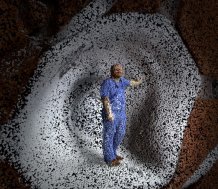
Dr Phil Mitchelmore, by Simon Ryder
An exciting new 3D photography exhibition will showcase the research and people behind Exeter's highly interdisciplinary approach to tackling the urgent global health threat of antimicrobial resistance.
The images will feature in the free exhibition "Researching Resistance', on display in the Forum on the University of Exeter's Streatham campus from 15-26 November, overlapping with Antimicrobial Awareness Week which runs from 18-24 November.
Antimicrobial resistance, or AMR, is an issue developing on a global scale, sometimes referred to as the "next pandemic". Microbes that cause infectious diseases in humans, animals and plants (also known as 'superbugs') are becoming increasingly resistant to the drugs we currently use to treat them. Despite substantial global effort, there has been little progress in the development of new antimicrobial drugs for over 30 years.
The exhibition will highlight the work of the University of Exeter's AMR network which brings together social scientists and humanities specialists with microbiologists, mathematicians and many more. Their members come from academia, industry, the UK Government and beyond. Working together in this way is needed to quickly and effectively realise the societal change that is desperately required.
The exhibition is a collaboration between investigative artist Simon Ryder and the University of Exeter's AMR network, and has been curated by Dr Kelly Thornber. It features portraits of fifteen members of the network, all from different research areas and career levels, to demonstrate that AMR is an issue that goes beyond disciplinary, societal and national boundaries.
Dr Thornber said: "'In 'Researching Resistance', we aimed to bring our AMR network to life, and showcase the diversity of our amazing members from across the University, who are all working towards a single goal yet approaching it from totally different perspectives. To address AMR we need action at all levels of society, both nationally and globally, so we wanted to show how our collective research efforts reflect that."
Professor Rich Smith, Deputy Pro-Vice Chancellor of the College of Medicine and Health and Professor of Health Economics added:"Antimicrobial resistance is a very real global problem. Research has shown that, by 2050, it could be the cause of 10 million deaths a year and significant damage to world economies, forcing increasing numbers of people into extreme poverty. The challenges can only be met by interdisciplinary working. This exhibition represents just some of the breadth and depth of research taking place across the University that seeks to address the challenges of AMR."
The fifteen researchers featured in the exhibition worked closely with Simon to identify elements of their work that were important to them and their AMR interests. Despite the challenges of the COVID pandemic, Simon managed to photograph them all, either at home, at their place of work or at their favourite location, manipulating the images further during editing process to help reflect the nature of network and their research. He said:"I was looking for a way of blending academics and their work into an overall portrait of the AMR network, to show the diversity of people and research being undertaken in this important field. I chose to do this using the medium of point clouds, atomising everything to a 3D mass of dots that you can imagine flowing between images, mixing and reforming, a single mass of resistance."
'Researching Resistance' will be available to view in the Forum on the University of Exeter's Streatham campus from 15-26 November. Admission is free.
You can also view an on online version of the exhibition which features a selection of the portraits on the Arts and Culture website here.
This exhibition was made possible thanks to an original award from the Provost's Fund to establish a University of Exeter AMR Network, and a generous donation from the MRC Centre for Medical Mycology. It also has roots in a Creative Fellowship that took place in the 2020/21 academic year, funded by the University of Exeter's Arts and Culture team and hosted by the Wellcome Centre for Cultures and Environments of Health.






